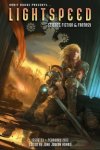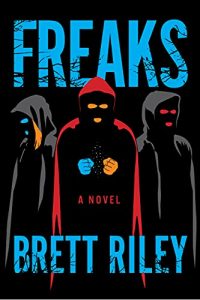Lois Tilton reviews Short Fiction, mid-February
The usual monthly ezines. I call Lightspeed best overall this time, particularly the more explicit fantasy half.
Publications Reviewed
- Lightspeed, February 2013
- Eclipse Online, February 2013
- Strange Horizons, February 2013
- Beneath Ceaseless Skies #114-115, February 2013
Lightspeed, February 2013
A strong issue. As often, much more fantastic than sciencefictional. Some author name changes here – Charles Coleman Finlay became “C C” some time ago, and M Bennardo is now using his full name, “Matthew”.
“The Infill Trait” by C C Finlay
“Every time I fall asleep I wake up in a different body.” That’s starting directly! “I am a hero I am a terrorist.” The narrator is, or was, Jimmy,
a soldier who answered a call and went to Langley to learn the protocol. IPAE: infiltrate, penetrate, assassinate, extricate. It all starts with the I that is not I only, the I that can pass as a we. Jimmy was the prototype for the protocol, the only one of the recruits who could demonstrate the I-into-we, who had the infill trait.
But something went wrong, and now not-Jimmy is on the run, trying to get to England where there is a doctor who might be able to help, except that the system is stacked against hero/terrorists trying to fly to England, particularly when their ID is back in their last body, now starting to cool off. All this has not-Jimmy freaked out.
This fairly short piece is SF horror, with readers being drawn into the narrator’s growing paranoia. It’s not that we disbelieve his story, but his situation and his reaction to it are disturbing. Also disturbing is the knowledge that this is the sort of thing our governments would certainly be trying if they thought they could pull it off, making hero/terrorists in their war on Terror.
“Harry and Marlowe Escape the Mechanical Siege of Paris” by Carrie Vaughn
Another in this steamish alternate history in which Princess Maud of the British Empire goes incognito as a spy named Harry, to thwart the belligerent designs of the German enemy, now menacing France. It is in fact the episode in which Harry and Marlowe meet, during the bombardment of Paris when the Germans attack with automata.
There were several of them, segmented, undulating bodies slithering along the walls in defiance of gravity. Spikes on their bellies dug into the wallpaper. Bits of powdered plaster rained down as the spikes drove into the wall, a constant spattering of dust, a destructive trail marking their passage.
Action and derring-do. In corsets. And a bit more background on the offworld source of the Aetherian technology that this world’s powers are going to war for. It’s a bit odd to have this one coming after [as far as I’ve seen] the only other piece in the series, which started out dumping readers directly into the middle of the ongoing action. But in this sequence, the significance of the meeting portends rather more of what we’ve already seen.
“Abyssus Abyssum Invocat” by Genevieve Valentine
“The deep calls unto the deep.” Miss Warren is a strange young woman come to teach at a [boys’?] school in Cornwall, and she writes stories about the mermaid who perishes for love. The stories are meant as a warning to Matthew, who is drawn to the dream of mermaid.
Sometimes he looked out the windows of the library and said the words over and over to the glass, his lips barely moving, watching a figure in a slate-gray dress walk the narrow path that wandered too close to the sea.
But he wasn’t afraid, watching her; if the waves rose and claimed her, he would run down the rocks and dive into the sea, and seek her until he found her.
Powerfully evocative, reminding readers that mermaids are another form of siren.
–RECOMMENDED
“The Herons of Mer de l’Ouest” by Matthew Bennardo
In 1761, Armistead is exploring the Pacific coast in search of a Northwest passage when he is awakened to see a hunter taking a deer on the shore. But instead of a human, the hunter appears to be a giant heron, at least seven feet tall. Nearby in the forest, in a clearing full of bones, including the bones of a human child, he makes an even more dire discovery.
My eyes followed the trunk of one of the oaks up to the bare branches that spread against the white winter sky like cracks in the firmament. And there, silhouetted in black, I could see the loose ovoid webs of nests balanced precariously—herons’ nests, in tree after tree, everywhere surrounding me, two dozen of them in the clearing or more.
A very original dark fantasy, told in a haunting narrative voice, a tale of men discovering brotherhood even when they cannot understand each other’s language.
–RECOMMENDED
Eclipse Online, February 2013
A pair of stories about those who are left behind, in different ways. The editor calls the Palwick story science fiction – I think not.
“Sanctuary” by Susan Palwick
After the Rapture, among the Left Behind, things are chaotic, in both the social sense and in the transformed powers of the survivors. A small group of the damned is hanging out at Cyn’s place, that used to be a BDSM dungeon, Before. It’s home, it’s safety. Then a newcomer shows up, bringing more trouble than ever.
His shirt and jeans had been white once; so had his scuffed cowboy boots. He was Broadcasting a golden glow, just slightly brighter than the hazy sunshine we stood in, and words unscrolled above his head, illuminated like an old manuscript. I am the Way, the Truth and the Life. No one comes to the Father, except through me.
The thing about fantasizing the Rapture is that you get to imagine it any way you please, because it can’t really make much sense anyway. Underscoring this are the angels, puking and dirtying their diapers. So who’s to say the world isn’t full of people who believe in all that stuff and want to make up for their perceived sins? People who would see a Jesus-figure as a blasphemer who has to be lynched. At any rate, it’s not about him, it’s about the others, trying to come to terms with why they were abandoned and still trying to be the best people they can.
“On the Arrival of the Paddle-Steamer on the Docks of V—” by Peter M Ball
A Valentine story, of sorts.
We’ve come to V— because Patrick wants to be kidnapped by faeries, and this is one of the few remaining places where such things are possible. The fey come to the docks every three years and select pretty, foolish boys to leave the world behind. Seven boys disappear, going to the land of the fey. We do not know what happens then, but Patrick is sure that it’s better than staying here.
Patrick is the young and pretty one; the nameless narrator, his lover, is neither. And we know that bargains with the fairies always come with a curse.
Inexplicable are the ways of love. Yuri the hotel keeper stands for the partners who have been left behind, bitter and cynical. What the author doesn’t tell us is how many have made the choice the narrator did.
Strange Horizons, February 2013
A stronger issue of this weekly ezine; I like two out of the three original stories. They can all be considered science fiction.
“Live Arcade” by Eric Amundsen
A video game that ends up playing the player IRL.
i don’t have to, do i? No game had ever asked the kid not to play before. The kid couldn’t tell Murr that, though. Play or don’t play.
Neat stuff here. Fresh and engaging YA. I particularly like the way the author exposes the fairytale roots of the eternal quest.
“The Long Road to the Deep North” by Lavie Tidhar
Another piece from Tidhar’s seemingly infinite mosaic future history. Here, the narrator follows the path of the spacelines poet Bashō, whose works have been quoted in many of the other fragments.
Bashō nevertheless left us a gift, an elevation of the style he himself had brought into life, the form of poetry in that near-universal contact language, the asteroid pidgin that had come, in its turn, from the beach languages of Melanesia as its island-speakers were brought as workers into space. Bashō had taken the vocabulary and structure of old Bislama and Tok Pisin and Solomon Pijin, applying it to what he saw on his journey, working in haibun to combine poetry and prose into a narrative of human space.
The narrator conveniently translates the poems for the reader. The trick, I have found, is to speak them aloud – or to listen to the podcast. The story is a journey of discovery, joyful discovery of wonders and of a new way of seeing. Also of smelling. There is a strong emphasis on olfactory sensation here:
Earth was suffused with indelible smells, rice vinegar and incense, beer and perfume, brine and rain and sex, of tuk-tuks and plastics, of fire and smoke and human and fish. I was afraid, I had not gone off-world before, I did not know what it would smell like.
There are fragmentary references to other bits of tile from the series, but other than a bit of clutter, they don’t much impinge on the story at hand, Bashō’s journey. I can’t help thinking that it somehow also follows the author’s extensive travels, which have informed much of his work. Well done.
“The Clover Still Grows Wild in Wawanosh” by Kelly Rose
Post apocalypse. A small group of people live fugitive postapocalyptic lives, like people do in postapocalyptic stories, trying to find meaning and love in their lives.
Beneath Ceaseless Skies #114-115, February 2013
Unconvincing intrepid princesses in #114; in #115, the better issue, men meddle with magic beyond their understanding.
#114
“Beheaded by Peasants” by James L Sutter
We’re in a familiar post-apocalypse world with America fragmented into warring kingdoms, fighting over scarce technological resources. A legitimate heir to the throne is confirmed by an oracle that predicts the manner of the sovereign’s death; this is supposed to keep them from getting overly ambitious – a proposition I find rather dubious. Alana, however, has revolutionary inclinations; she has promised to abdicate and proclaim a democracy upon reaching the throne. She has also promised her father not to. O, decisions!
I’m not totally convinced by this scenario. As it’s set out, it seems that the really urgent task for the nation is to resolve the war with the next-door kingdom, whose people are beset by the toxic and mutagenic residue of previous technology. If I were the oracle, I’d predict any disunited democracy would quickly be overrun.
“The Crimson Kestrel” by Leslianne Wilder
This one starts out badly by setting its story in a fantasy town of “Le Echelle”, which is incorrect French. There seems to be a sort of vertical Versailles, where the decadent aristos look literally down at the pantless. Here, Ivette is a sort of female Pimpernel in breeches:
Her mountain of skirts fell away, and their pocket and petticoat undersides revealed her arsenal: the red silk mask with its falcon patterns, cut open back so her brown curls could flow free; the grappling hooks, rope, and launching mechanisms; . . .
Derring-do, plastered in cliché.
#115
“Sate My Thirst with Ink and Blood” by Adam Calloway
Torin the gourd-seller is far from home hunting treasure; we meet him sheltering from a sandstorm in the lee of his dead, stolen camel. His next move is to enter the accursed, ruined city Lacuna, where he ignores the warning of the spectral mystics who follow him with helpful advice.
“Stay then, but do not venture inside these ruins. If you find paper—a broadsheet, a novel, a scrap—burn it for light and be thankful. Do not let your eyes devour it, as we know you of the north are wont to do.”
The narrative voice, touched with dark humor and wit, is the making of this one. Readers may recognize the author’s paper city, Lacuna, and wonder at its fate.
–RECOMMENDED
“The Language of True Things” by Nick Scorza
A boy is apprenticed to the Master Speaker, having shown a capacity he didn’t really comprehend at the time.
One poor beetle had been alive in the sack of its dead fellows he’d purchased at market, and now it struggled, half-crushed, at the edge of death. The boy was filled with sadness watching the little blueblack insect’s last moments, and his head was suddenly ringing
with a word for what he witnessed—a word which was struggling to escape his mouth as urgently as the beetle was the bowl.
Now he learns to speak in the language of true things, where the word and what it represents are the same. But while he comes to prize the learning for itself, he has a purpose of his own – to open the temple where his mother has been immured by her god.
This system of magic has intrinsic interest, but it isn’t quite clear just what function a Speaker plays, what use he is to the city where he lives. At the conclusion, readers may be left let down by the indefinite condition in which the author leaves his nameless protagonist.






Pingback:Beneath Ceaseless Skies - BCS Reviewed at Locus Online and Tangent